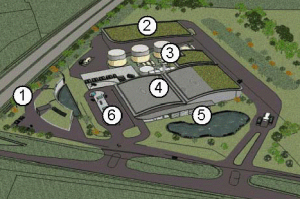Plans for Waste Incinerator in Surrey dropped
 Surrey County Council today announced that there are no longer plans to build Energy from Waste (EfW) incinerators in Surrey.
Surrey County Council today announced that there are no longer plans to build Energy from Waste (EfW) incinerators in Surrey.
Outlining the council’s new waste strategy plans, Leader of the Council Dr Andrew Povey said: “I am very pleased to announce that we are scrapping plans for any EfW incinerators in Surrey. Today I will be instructing that the planning applications for incinerators at Capel and Trumps Farm be withdrawn.
“With our help, and that of our partners, our residents are now doing so well at producing less waste and recycling more that we are in a position to look at alternative methods of dealing with our waste and saving both money and our countryside.
“The way to achieve this is by diverting waste from landfill. The practice is not only destructive to our landscape and environment but the taxation on landfill alone currently costs us over £7 million per year. This tax is increasing at an alarming rate and will have almost doubled by 2013. If we don’t act now the Surrey taxpayer could be paying as much as £13m annually in landfill tax alone within four years, so our goal is to avoid putting any waste in landfill by then.”
The council’s new approach to waste will concentrate on reducing the amount of waste Surrey produces, encouraging people to reuse things where they can and recycle as much as possible after that. The new plans will lead to a reduction in the amount of household waste dealt with every year by 35,000 tonnes, enough to fill the Royal Albert Hall 14 times. As a result the county will be making substantial savings in waste disposal costs by 2013. Minimising waste alone will result in estimated savings of £3.5 million per year in disposal costs.
Cabinet Member for the Environment and Redhill Councillor Lynne Hack said: “A key element of the county council’s new waste vision is an Eco Park, which would be the first of its kind in the country. It would incorporate a range of waste treatment facilities, an innovation centre to look at and develop the latest technologies and an education centre open to all.
“The Eco Park would include an anaerobic digester and a gasifier, which would be half the size of the EfW plants originally envisaged for Capel and Trumps Farm.”
In a gasifier, waste is heated to produce a gas, which can then be burned cleanly at high temperatures to provide energy in a similar way to natural gas.
Anaerobic digestion is a natural treatment by which food waste is broken down producing gases, which can be converted into energy. Last year 100,000 tonnes of food were thrown away in Surrey. The council is already working with the district and borough councils on separate food collections, which should be operating throughout the county by the time the digester is ready.
Because of successes in minimising waste and increases in recycling, Surrey requires much smaller plant than the proposed EfW incinerators. Together the gasifier and the anaerobic digester would treat 100,000 tonnes of waste per year, a considerable reduction from the 270,000 tonnes proposed for the EfW incinerators. They would produce enough energy to power 10,000 households, which equates to one fifth of the houses in Guildford. This ‘green’ energy would be sold to the national grid.
The new Eco Park plans would cost £50m, significantly less than the £200m it would have cost to build two EfW incinerators.



 Twitter
Twitter RSS
RSS